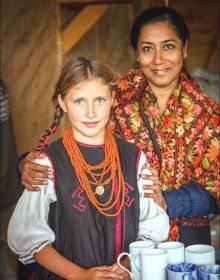People who for the first time meet Mridula GHOSH, the chairperson of the East-European Development Institute, human rights champion, and contributor to The Day, often feel surprised – so brilliant her command of Ukrainian language is. Whereas the government has taken a passive stand in advancing and promoting Ukrainian in the world, Mridula has translated poems by Ukrainian writers into Bengali language and compiled a collection of poetry Ukrainian ornament. She has also translated The Forest Song by Lesia Ukrainka.
On the International Mother Language Day The Day spoke with Mridula about Ukrainian language and language policy.
Last year was a hard time for the Ukrainian language. The law “On the fundamentals of the state language policy” was adopted, which was followed by a wave of protests. And recently Vadym Kolesnichenko accused Mykola Azarov of not keeping to this law. As a person who has a brilliant command of Ukrainian, unlike many Ukrainian politicians, what did you feel when you observed these events? I am speaking not about political assessment, rather the way the society has coped with this challenge. Has it coped, what do you think?
“I would not speak about politics, but I would distinguish between the politics of language, which is interference of politicians with a hidden or open goal into the language environment, and language policy. In my opinion, these two notions are perceived nearly as synonyms in Ukraine. The adoption of the law is not a language policy. Language culture is another question. Language policy is rather a question of state-governing, which is strategic to some extent, whereas the culture of language is a civilization phenomenon. In my opinion, apart from some aggravation, last year’s events did not yield any fruit. In terms of a civilization phenomenon Ukrainian language has been and will remain. Nothing will destroy it. Conversely, it gives a great cultural growth. Many books have been published and other kinds of culture products have been created.
“Books have been published in Russian, too. Why is everyone so reluctant to understand that by number of speakers the sphere of Russian language will shrink? There are studies that prove this. Therefore it is quite natural for Russia to advancing its language policy in the post-Soviet states. At the same time nobody prevents Ukraine, which aspires to become an EU member, from having a language policy of its own – not only by means of slogans, but concrete budget items. Incidentally, the number of Ukrainian speakers will also decrease. But the society will manage, this time as well. In Kyiv I hear Ukrainian with increasing frequency, but there are some paradoxes. In usual shops people often speak Ukrainian, but they never do so in boutiques. Ordinary people rejoice when I speak Ukrainian, however, in ‘respectable echelons’ there are people who don’t know me and they still are surprised or ridicule me for speaking Ukrainian, with their eyes asking: why do you need it? This is a deja vu from the moment when a teacher at the university recommended me not to study this ‘provincial language’! Therefore my strong desire to see integration courses of Ukrainian language for ethnic minorities and foreigners remains unreal to implement. That means there is work to do. Preserving and enrichment of a language is a social-civilization call rather than a party-political one.”
You have translated the works of many Ukrainian poets into Bengali. Whose else works would you like to translate? Does Ukraine’s Embassy to India support your projects?
“Currently I am working in a somewhat broadened format. I have some ready translations from other East and South European languages. I also translate from Russian. I started some things long ago, and I am in the homestretch with some of them. There are new works. I write works of my own. I have given the copies of anthology and CD with a translation of Forest Song, which I have made for Ukraine, to Ukraine’s Ambassador to India as a present. You know, I am not waiting for governmental structures to help in my creative initiatives. Therefore all the projects within the Tagore Center in Ukraine have been accomplished without any financial assistance or any other support from Indian government structures, even those dedicated to Tagore’s 150th birth anniversary. When Ukrainian president was on a visit to India, the Indian president mentioned this celebration of this event in his speech, but he did not mention our institution. Is there any hope for Shevchenko’s 200th anniversary? Time will show.”







